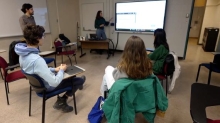The Classroom A/V Instructions application is moving to the Browse Classrooms widget on the McGill IT Support website on December 13th, 2024.
Classroom audiovisual information will now be available on a platform the community is familiar with. You’ll also be accessing it more securely with single sign-on (SSO) and two-factor authentication (2FA).












